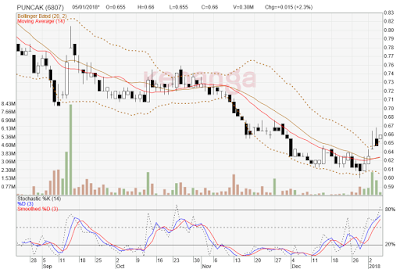It is believed to be in line for a major government water project in 2018 which, if successful, might relieve some pressure for
the struggling company.
According
to a source close to the deal,
the company is moving forward in discussions with government officials
to clinch a non-revenue water (NRW) related project. Essentially, NRW is
treated water that is lost in the distribution process (for example,
through theft or leaking pipes) from the plants
to consumers and end-users.
Talks
between Puncak Niaga and the Ministry
of Energy, Green Technology andWater are already at an advanced stage.
It is believed the company is bidding for a major NRW project
nationwide. The contract could involve several states in the peninsula.
However
observers believe it
could be tough for Puncak Niaga to land the project due to political
factors. The water business is a politically sensitive matter,
especially in opposition-led states like Selangor. The fact that this is
election year (2018) could be a major stumbling block
to get the deal done. If the NRW project involves Selangor, for
example, the company’s legal action against the state could make things
complicated.
In
November 2017, Puncak Niaga filed a RM14
bil lawsuit related to Selangor’s takeover of its water assets in a
restructuring exercise. The former concessionaire is citing abuse of
power by the state government in the water restructuring which saw
Puncak Niaga disposing of its highly-prized subsidiary
Syarikat Bekalan Air Selangor (Syabas) in 2015 for RM1.55 bil.
Although it is not known how much the new project might be worth, NRW management can be a lucrative business, especially
in states and countries where there are major water supply problems.
For
example, Ranhill Holdings Bhd which runs its water concessionaire
business in Johor is targeting to grow its NRW
business to RM100 mil per annum. In general, the lower the NRW the
better it is because it means that water is being more efficiently
distributed.
Malaysia’s
average NRW in 2014 was about
35% and the government is targeting to lower that figure to 25% by the
year 2020. To achieve this, the National Water Services Commission
(SPAN) estimates RM13 bil of capital investments in water distribution
systems would be needed.
Puncak
Niaga has been on a downward spiral
in the last two years (Till end Dec 2017), especially since losing its
water concessionaire business in Selangor in 2015. It was the company’s
major revenue contributor and it has not been able to adequately replace
it.
In the subsequent financial year 2016 (FY16)
after the Syabas deal, Puncak Niaga posted a net loss of RM258.9 mil. As of the third quarter ended Sept 30 last year, its loss amounted to an estimated RM98 mil, bringing accumulated losses to over RM355 mil since the Syabas sale.
To
make things worse, in 2017 the company
cut its losses in China where it had several water-related projects and
withdrew from the market completely. Its pullout from China was said to
be mainly due to regulatory problems and difficulties in dealing with
various state agencies there.
Other
than its core water business, Puncak
Niaga’s attempts to use the proceeds from the Syabas sale as a
springboard to become a major oil-and-gas and plantation player have
also fallen flat. Its O&G venture has practically stalled due to the
crude oil price collapse in the past few years (Till mid
June 2017).
Oil prices are still volatile (Till end Dec 2017) and Puncak Niaga suffered big losses in the sector. It remains to
be seen whether the oil price rebound (Till Jan 2018) will lead to a reversal of fortunes in this sector for Puncak Niaga.
Although the company has purchased some oil palm land in East Malaysia, its plantation expansion has also suffered a
similar fate and has not made any significant impact on the company’s revenue so far (end Dec 2017).
Even
if its plantation acquisitions achieve positive revenue, it remains to
be seen whether it will be good enough
to turn around the company. A lot of the plantation land in Sarawak
that it acquired is still vacant and will need time to yield results, so
there are question marks as to when it can start contributing to Puncak
Niaga’s revenue stream.
In
July 2017 the company completed the purchase of Danum Sinar Sdn Bhd, an
oil palm plantation company in Sarawak, for
RM276.59 mil, a price 38% lower than originally proposed due to
revaluation of the land. Danum Sinar has a total of 46,674ha of
plantation land in Murum, Sarawak but the bulk of the land (or
33,372.6ha) is unplanted.
The
sale was a part of a consolidation process
driven by the Selangor government, returning control over the water
industry from the private concessionaires to the state agencies.
Selangor
had privatised its water industry
in 1994 with the state government taking charge of water supplywhile it
delegated water production and distribution to private concessionaires.
At
the moment, Splash remains the only concessionaire
in Selangor that has not been taken over by the state. Due to
differences in valuation, the two parties are still negotiating and have
had several deadline extensions.
Prior
to 1994, the Selangor water industry was fully managed by Jabatan
Bekalan Air Selangor. After the opposition wrested
control of Selangor in 2008, the state government rejected two tariff
hikes (37% in 2009 and 25% in 2012) proposed by Syabas and began the
drawn-out process of consolidating control of the water assets back into
state hands.
.png)




No comments:
Post a Comment